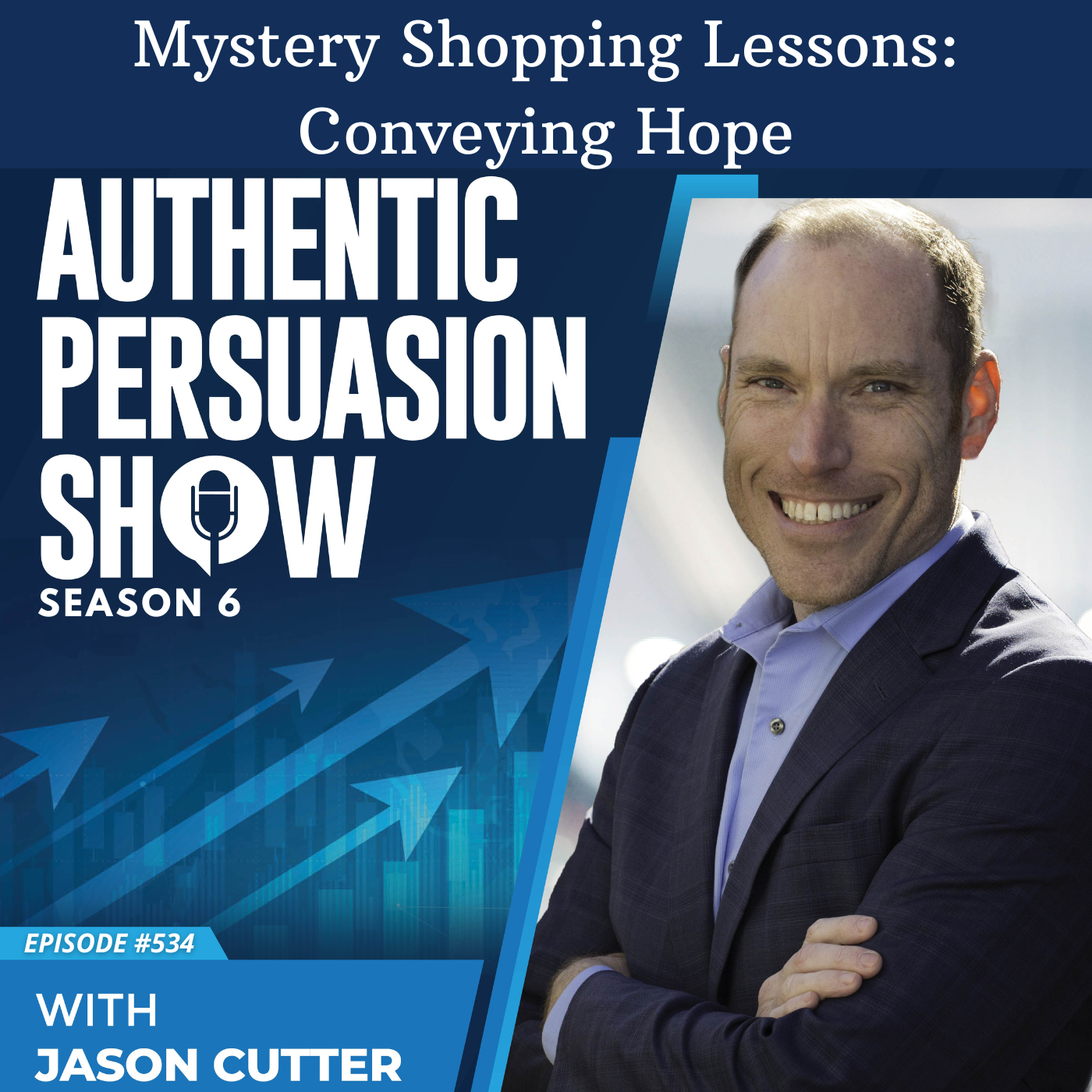Episode Transcript
Jason [00:00:00]:
This is the authentic persuasion show. Hey, what's going on? In today's episode, I'm going to share why I strongly dislike the negotiation as a sales phase. All right, so let's talk about this. And I saw this in a book recently. I love most of the book. There's so much in it that's completely mind changing in the world of sales. And it explains why so many sales teams struggle, why so many sales processes are broken, and why so many sales leaders are literally doing it wrong.
Jason [00:00:35]:
And I mean that like literally doing it wrong. And here's why I can say doing it wrong because. And the book is called the sales Innovation Paradox by Dr. Howard Dover. And the big key is that as sales innovation, as technology, as teams have grown and invested and spent more results are down. People are. I think the stat is like, it's less than 50% of quotas being attained by b two B salespeople. And so more is being spent, more is being done, but less results are happening.
Jason [00:01:04]:
And that means it's broken. And that means you're probably doing something wrong in your process, most likely. Like, it's very possible if you're listening to this, especially if you're in b two B sales, you're doing something incorrect just based on the fact that if your results are not there, if you're investing and you're doing things that scale air quotes and your results aren't scaling, and it's actually getting harder, then that means something is broken. Now, here's one of the things in that book, and this is the focus for this conversation, not the book itself. But there's one thing in there where he talks about the stages of sales and one being negotiation. Right? So the sales process for the buyer should look like this. And I see this a lot of times, right? I see this as a standing point in sales playbooks. Like, it's okay.
Jason [00:01:51]:
Now, here's the negotiation phase. Like, we've got to do this. Here's my take on this. This is why I strongly dislike this, is because if you're negotiating or you're planning on negotiating or you're anticipating the need to negotiate anything with your potential buyer, you're doing it incorrectly. You've missed some step. Now, there's two things that could be at play is one is you think that you are negotiating or need to negotiate, because for some reason, your customer thinks that what you sell is a commodity that can be bartered or there's terms that can be negotiated. Now, I'm not talking about selecting terms like we have this twelve month agreement where you pay x. Or we have this six month agreement where you pay y.
Jason [00:02:39]:
Right? Or there's a twelve month agreement. If you sign this contract, you're going to pay x, and then if you want to go monthly, it's y, right? Like we see that for software all the time. I'm not talking about that because that's options. Do you want option a or do you want option b? What I'm talking about is where the buyer says, well, I don't want to do a twelve month contract, I only want to do a six month contract. But that's not an option you gave them. Now they're negotiating back and forth, which means they view you as a commodity, they view you as something where they own you. And now most of the time, this has been my experience. This happens because of cold outreach, kind of what I was talking about earlier with the sales innovation paradox book and so much effort being put on cold outreach.
Jason [00:03:24]:
Emails, LinkedIn, social media, sdrs, bdrs, cold outbound, even b to c. It's like telemarketing and things like that. Here's my take on this is when I cold call you or cold email you or cold anything, you and you respond, you now own me and the conversation. And the reason why is because psychologically, consciously, subconsciously, I begged you for attention. Now I'm not saying don't cold call. I'm not saying don't do any of those things. You just have to understand the dynamic. If I cold call you and I say, hey, have you ever hired a consultant for third party training? Like had somebody come in, have you ever brought somebody in? What was the results like? Would you be interested in that? What are the issues that you're facing with your team? And just asking those kind of things.
Jason [00:04:13]:
I'm asking for your business. Like if somebody comes to your door, knocks on your door, they're begging you for the time and the attention because they have something they want to sell to you, but you're technically in the driver's seat, like you own it, versus when you know that you have an issue or a need, right? It's not just about avoidance of pain. Sometimes it's hope for gain. And you have something that you want. Now that salesperson who has what you want has more of the power and control, right? You still have the ability to make your decision, but if you know what you want and they have what you want, you've got to be careful, because now they control that, right? Like the saying of never let them know, how much you want the deal, or in a relationship, like all that kind of stuff, it's all similar. Okay, what's the price? Oh, you just see this classic scenario of where, let's say a couple is going to go buy a car and one person's like, I absolutely love it. We have to have this car. And then the other person's like, wait, don't say that.
Jason [00:05:17]:
Don't let them hear that, because now they know we want it, and now they own us. Right? Versus the other way around where it's like, if I'm cold calling you, I'm begging for your time and attention, and you are in control because now you get to decide the terms, what you want, what you don't want. And that's where this negotiation step comes in. I promise. And again, we're not talking about options. We're talking about negotiation as a planned stage. If you're planning and anticipating and preparing for negotiations, you're doing things incorrectly. It means either, a, you're setting up the relationship wrong, where you're probably begging for the business or the time or the attention, or two, you've made it so that they think this is a negotiation and there's some back and forth, right? It's not just, here is the package deal.
Jason [00:06:06]:
Here's how it works. We are a professional. I can't imagine you would never go to a doctor, and then the doctor say, all right, we need to do surgery for x, y, and z. And for you say, okay, well, how much is the surgery? The surgery is going to be $10,000. All right, could you do it for eight? Right. Like, no, we have an issue. They have the solution. We're going to do it.
Jason [00:06:32]:
And we know that that isn't something where you negotiate. Right. Some parts of life, maybe you can negotiate, but you don't go into a furniture store and negotiate on a couch. It's some kind of preconceived notion that in car sales you would negotiate on car sales. But even that, there's dealerships now that people prefer where there is no negotiation. This is the price. Take it or leave it. This is an item and this is the price.
Jason [00:06:56]:
Right. You don't go into a jewelry store and negotiate. Is the price listed? Is the price listed. Maybe you can get some extra perks thrown in, but you're not going to negotiate the price. And so if you're planning on negotiation as a sales requirement in your stages, if you're building that out, if it's in your playbook, all right, prepare for negotiation. Here's how to handle. You're missing some steps, because if you find the solution, if you go through your discovery process with empathy and you find out what they want and need and what's been getting in their way before and getting in their way now and then, where they would rather be, what's the better place for them to be at? When you figure that out, and if you have a solution that's at that intersection where it can help them and get them to where they want to be, then there should be no negotiation. You have this problem, you have this outcome.
Jason [00:07:49]:
You'd like. I have this solution. Now the next part is x, Y and Z. This is also my fundamental issue that I have with asking for the sale, where the standard advice is, oh, if you want to close more deals, it's probably because you're not asking for the sale. Right? Again, going back to the doctor, does the doctor say, hey, is this surgery something you would like to get done today? No, they just assume they went through their process. They're a professional, they diagnosed it, they prescribed it, they have the solution. Is there any questions before we begin? Let's get you booked for next Tuesday. Anything else? Then they're moving forward, right? If you're asking for the sale and you're anticipating negotiation, you're doing something incorrect.
Jason [00:08:32]:
Instead, do discovery with empathy actually care? Find out what they want and need. Where a better place for them. What does it look like to get them to a better place? Are you that guide? Do you have the product and solution for them? If so, move them forward. Assume that they're going to move forward. Expect or be prepared for some questions, some concerns, maybe objections. But if you do things properly, you shouldn't get objections. You should just get questions and concerns and then just move them forward and just go that way. If you find yourself negotiating, I've seen this with so many reps and I've given this feedback to reps and to companies is there will be certain reps on the team that constantly get negotiations.
Jason [00:09:16]:
They're constantly going to their manager and saying, I've got this deal and they don't want to do the twelve month, they only want to do three month contract. Can we do that? Something got missed in that sales process. And if it's the same rep asking for it constantly, like as a percentage, it's something that rep is doing wrong. They're either not a good salesperson, they're not following the sales process, they're not doing things properly. As far as the fundamentals, like the authentic persuasion pathway. They are not using everything that they could to get to a point where there is no negotiation. Right. Because maybe it's a disqualifying the leads.
Jason [00:09:50]:
Maybe it's not a good lead. If that lead can't afford twelve months, do you really want them as a customer? The answer is no, because I promise they're not going to onboard, then they're going to cancel, then they're going to want a refund. And it's just going to make your life mess. And that's usually a qualification problem. So keep that in mind. Focus on that. Stop anticipating negotiation. Take it out of your playbook.
Jason [00:10:08]:
Take it out of your sales process. Do not have it as a stage in your process if you want to be successful at sales at scale.
![[625] Stop Negotiating](https://episodes.castos.com/salesexperiencepodcast/images/1527994/Stop-Negotiating.png)


